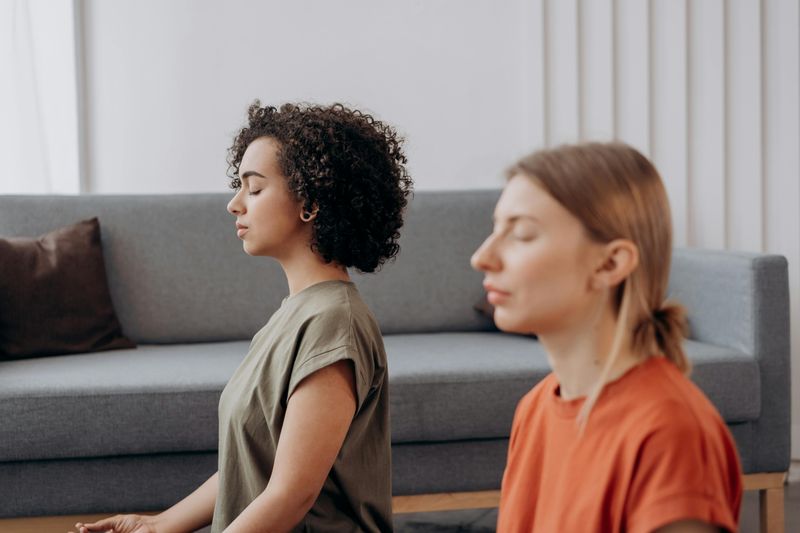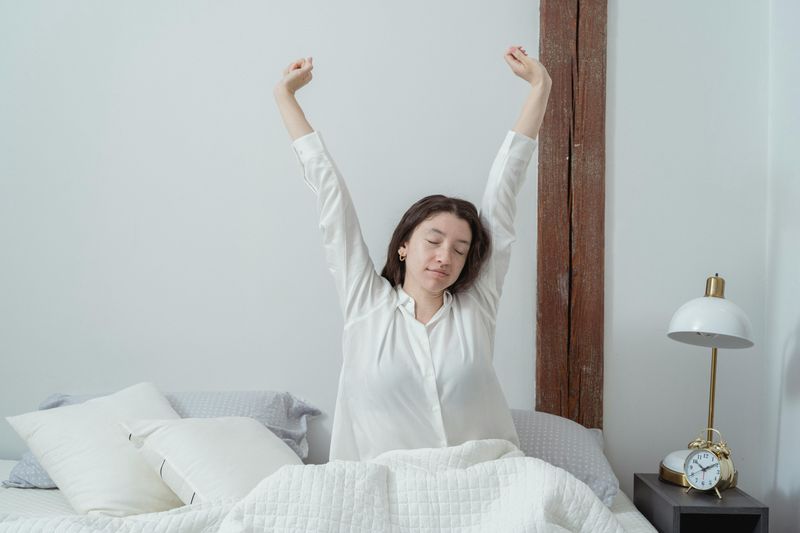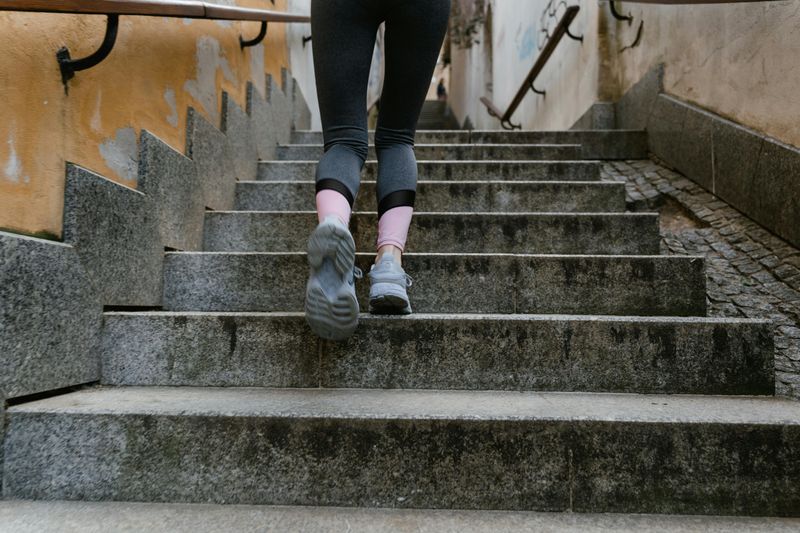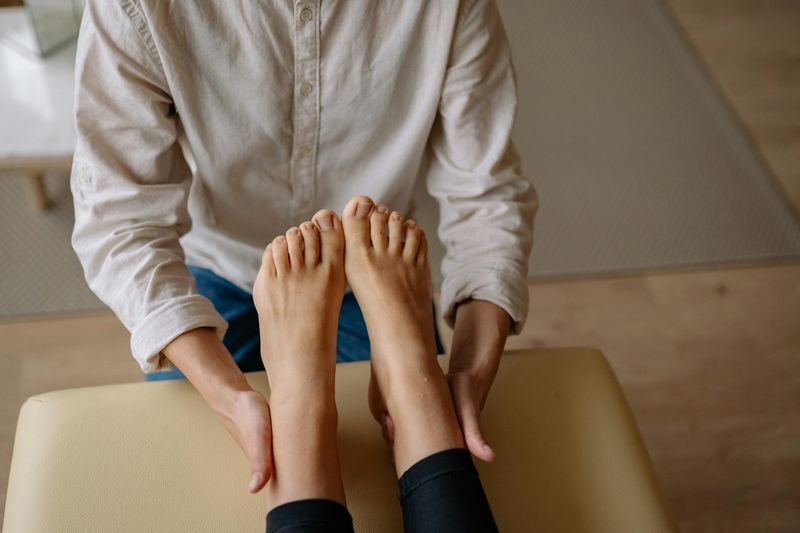Feeling anxious can make everyday life harder than it needs to be. The good news is that you don’t need major lifestyle overhauls to feel calmer and more in control. Mental health professionals have identified simple, science-backed tweaks that can ease your worries and help you breathe a little easier each day.
1. Practice Deep Breathing for Five Minutes Daily
Your breath holds more power than you might realize. When anxiety strikes, your breathing becomes shallow and rapid, which actually signals your brain that something is wrong. Taking slow, deliberate breaths activates your body’s relaxation response and tells your nervous system it’s safe to calm down.
Experts recommend spending just five minutes each day focusing on your breath. Breathe in slowly through your nose for four counts, hold briefly, then exhale through your mouth for six counts. This simple rhythm can lower your heart rate and ease tension almost immediately.
The best part? You can do this anywhere—at your desk, in bed, or even waiting in line.
2. Limit Caffeine Intake, Especially After Noon
That extra cup of coffee might be doing more harm than good. Caffeine is a stimulant that increases your heart rate and can trigger feelings remarkably similar to anxiety—jitteriness, racing thoughts, and restlessness. For people already prone to worry, caffeine can pour gasoline on an already flickering flame.
Mental health experts suggest cutting back, particularly in the afternoon and evening hours. Caffeine stays in your system for hours, disrupting sleep quality and creating a vicious cycle of exhaustion and heightened stress.
Try swapping that second or third coffee for herbal tea or water. Your nervous system will thank you, and you might sleep better, too.
3. Establish a Consistent Sleep Schedule
Sleep and anxiety are tangled together like headphone wires in your pocket. Poor sleep makes anxiety worse, and anxiety makes it harder to sleep. Breaking this cycle starts with going to bed and waking up at the same time every single day, even on weekends.
Your brain loves predictability. A regular sleep schedule helps regulate your internal clock, improves sleep quality, and gives your mind the rest it desperately needs to handle stress. Experts say consistency matters more than the exact number of hours you get.
Set a bedtime alarm as a reminder to start winding down. Your future, well-rested self will feel noticeably calmer.
4. Move Your Body for at Least 20 Minutes
Exercise isn’t just about building muscles or losing weight—it’s one of the most effective anxiety-busters available. Physical activity releases endorphins, those feel-good chemicals that naturally lift your mood and reduce stress hormones like cortisol.
You don’t need to run marathons or join a gym. A brisk walk around your neighborhood, dancing in your living room, or following a quick workout video all count. The key is getting your heart pumping for at least twenty minutes.
Research shows that regular movement can be as effective as medication for some people dealing with mild to moderate anxiety. Find something you actually enjoy, and it won’t feel like a chore.
5. Write Down Three Things You’re Grateful For
Anxiety has a sneaky way of hijacking your thoughts and pointing them toward everything that could go wrong. Gratitude practice is like hitting the reset button on that negative loop. By intentionally focusing on what’s going right, you train your brain to notice the good stuff more often.
Each evening, jot down three specific things you’re thankful for—big or small. Maybe it’s a delicious lunch, a friend’s text message, or simply having a warm bed. This isn’t about toxic positivity; it’s about balance.
Studies show that regular gratitude journaling can significantly reduce anxiety symptoms and improve overall mental health over time.
6. Set Boundaries Around News and Social Media
Constant scrolling can turn your brain into a stress factory. News feeds are designed to grab your attention with the most dramatic, often negative content, and social media encourages endless comparison. Both are recipes for heightened anxiety.
Experts recommend setting specific times to check news and social apps rather than grazing all day long. Consider removing news apps from your phone or turning off push notifications entirely. Give yourself permission to disconnect without guilt.
Did you know? Research from the American Psychological Association found that people who took breaks from news consumption reported lower stress levels and improved mood within just one week.
7. Try Progressive Muscle Relaxation Before Bed
Anxiety doesn’t just live in your mind—it settles into your muscles too, creating tension you might not even notice until it hurts. Progressive muscle relaxation is a technique where you systematically tense and then release different muscle groups throughout your body.
Start with your toes: squeeze them tight for five seconds, then let go completely. Move upward through your legs, stomach, arms, and face. This practice helps you recognize where you hold stress and teaches your body what true relaxation feels like.
Therapists often recommend this before bedtime because it signals your body that it’s time to rest, making it easier to fall asleep peacefully.
8. Connect With Someone You Trust Weekly
Isolation feeds anxiety like oxygen feeds fire. When you keep worries bottled up inside, they tend to grow bigger and scarier. Talking with someone who genuinely cares about you can provide perspective, comfort, and remind you that you’re not alone.
Schedule regular check-ins with a friend, family member, or therapist—even a quick phone call or video chat counts. These connections don’t have to be deep therapy sessions; sometimes just laughing together or sharing everyday moments can lighten your emotional load.
Human beings are wired for connection. Prioritizing relationships isn’t selfish; it’s essential maintenance for your mental health and can dramatically reduce feelings of anxiety.
9. Spend Time Outside in Natural Light
Nature has a remarkable ability to quiet an anxious mind. Studies consistently show that spending time outdoors lowers cortisol levels, reduces rumination, and improves mood. Even fifteen minutes in a park or your backyard can make a measurable difference.
Natural light also plays a crucial role in regulating your circadian rhythm and boosting serotonin production, the neurotransmitter that helps you feel calm and focused. Morning sunlight is especially beneficial for setting your internal clock.
You don’t need a wilderness adventure—simply eating lunch outside, taking a short walk, or sitting near a window with sunlight streaming in can provide these anxiety-reducing benefits throughout your day.
10. Create a Simple Evening Wind-Down Routine
Racing from full speed to sleep mode rarely works well. Your brain needs a transition period to shift gears from daytime stress to nighttime rest. An evening routine acts as a signal that it’s time to let go of the day’s worries.
Your routine doesn’t need to be complicated or lengthy. Maybe it’s reading for twenty minutes, taking a warm shower, doing some gentle stretches, or sipping herbal tea. The specific activities matter less than the consistency and the intention behind them.
Psychologists emphasize that routines create a sense of control and predictability, both of which are incredibly soothing when anxiety tries to take over your thoughts at night.










